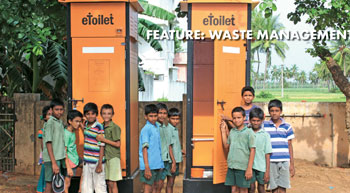Smart sanitation fundamentally involves high-tech solutions such as self-cleaning public e-toilets that address the challenges posed by conventional public toilets, says BINCY BABY.
Despite all the progresses India has made, it continues to be blighted by the lack of proper toilet facilities. Though the country has become technologically competent in many fields, when it comes to innovative ideas for technologies to support sustainable sanitation services, India is still in the developing phase.
While children suffer from malnutrition, diarrhoea, worm infections, etc., which cripple their growth and impact learning abilities, open defecation affects women in more inhumane ways, as their very dignity as a human comes under test.
While urban India has invested significantly in sanitation infrastructure, this has essentially been focussed on traditional sewerage networks, with some efforts directed towards individual and community toilets for the economically weaker sections of society. These efforts have failed to deliver a safe sanitary environment in urban India, as they typically lacked the comprehensiveness to address the full dimension of the sanitation challenges existing in the country Addressing this stigmatised social challenge is no easy task. It throws up a slew of problems such as lack of governmental vision, bureaucratic lethargy, resource/manpower scarcity, etc.
Given the experience in the segment thus far, it is necessary that future efforts consider a range of technical options ranging from on-site to centralised sewerage and treatment systems, with economic considerations to provide solutions that can cover all geographical locations and all sectors of society.
Modest beginnings
Down south, a modest enterprise has been doing something that has the potential to address the country´s vast sanitation challenges and take the Central government´s Swachh Bharat campaign to the next level. Thiruvananthapuram-based Eram Scientific Solutions has come up with revolutionary electronic toilets which are rewriting the very notion of public sanitation. Having been in the sanitation sector since the past eight years, it has come up with a revolutionary, futuristic, self-sustaining and resource-generating sanitation infrastructure.
E-toilets do away with all the challenges posed by conventional public toilets which are often in pitiable conditions due to lack of proper maintenance and cleaning. Studies show that people stay away from using public toilets due to poor hygiene. Smart sanitation fundamentally involves high-tech solutions such as self-cleaning public e-toilets that address the challenges posed by conventional public toilets. It incorporates a full-cycle approach in sustainable sanitation, by integrating electronics, mechanical, and Web-mobile technologies, thereby controlling entry, usage, cleaning, exit, and remote monitoring capabilities with multiple revenue options. The insertion of a coin opens the door of the e-toilet for the user, switches on a light – thus saving energy – and even directs the person with audio commands. The toilets are programmed to flush 1.5 litres of water after three minutes of usage, or 4.5 litres if usage is longer. It can also be programmed to clean the platform with a complete wash-down after every five or 10 persons use the toilet. To ensure a completely Make-In-India product, Eram has chosen only indigenously developed components.
These e-toilets are indigenously developed and have already scaled up on a massive scale. They have been replicated across 20 states in India with over 2,000 successful installations. We have also deployed model variants for women, schools, disabled and the general public. Chennai is the first city in India with the largest number of public e-toilets. The largest deployment of school e-toilets which was done for TCS happened in a span of just three months, with over 600 e-toilets deployed across Andhra Pradesh and Tamil Nadu.
Uniqueness of e-toilets
In India there are bio-toilets and portable toilets available. But Eram is the only Indian company to manufacture fully-automated, electronic-operated and sustainable e-toilets ideal for Indian needs. While Chennai has installed more than 200 e-toilets, Bengaluru has installed 100 of them.
These units come equipped with a user-friendly interface. Except for inserting a coin (which can be made free access, like in Chennai, where a mere pressing of a button will make the door open), a common user has no electronic interface. The electronic components are put only to ensure accountability of operations so that the e-toilet remains clean and hygienic for every user. There is also no chance of anyone getting stuck inside an e-toilet, because the exit is completely manual just like a conventional toilet.
Made of stainless steel, e-toilets can last for more than 15 years. A study conducted by the Chennai Corporation about the long-term financial impact of e-toilets versus conventional toilets found that e-toilets are cheaper over a period of five years.
Advantages of e-toilets
- Easy to install
- Consumes less water – sensor-based water minimisation
- Power efficient – automated exhaust fan and lights
- Enhanced cleanliness through auto flushes & floor washing
- Unmanned operations
- Automated access control – coin/free entry
- Automated pre-flush, post-flush and floor wash mechanisms
- Solar integration possible
- No regular manual cleaning/maintenance required
- Remote monitoring via GPRS and generation of online reports
- E-toilet mobile app for user and authorities
- Outdoor advertising space on e-toilet panels for income generation
- Free warranty of six months and one-year insurance coverage
- Well-defined maintenance plans
- Connected e-toilet infrastructure
About the author
Bincy Baby is Director, Eram Scientific Solutions. She has extensive experience in IT project management, project conceptualisation, strategic planning, e-governance project implementation, and security management systems. Baby heads strategic initiatives, collaborations with research institutions, and networks with organisations for defining and establishing new and sustainable business models, improved product and services, and to sustain world class sanitation solutions.



Leave a Reply
You must be logged in to post a comment.